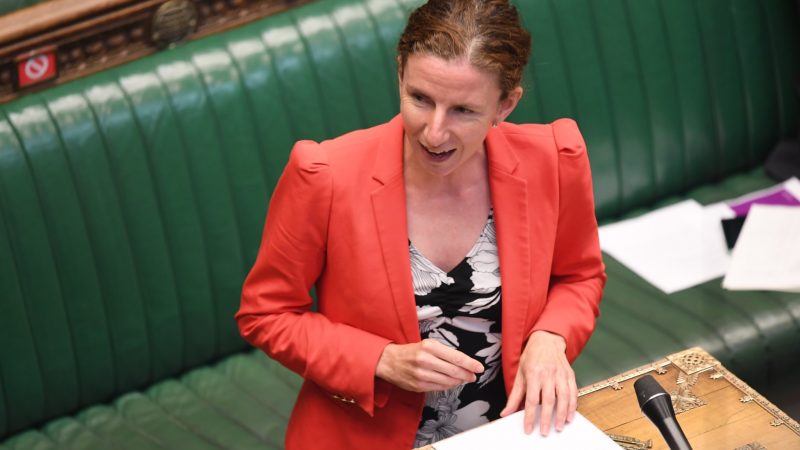
Anneliese Dodds has warned that self-employed homeowners in the UK face a “bleak winter” after new Labour analysis found some will be left to live on just 30% of their pre-coronavirus income over the coming months.
The Shadow Chancellor has highlighted that cuts to the self-employment income support scheme (SEISS) announced by Rishi Sunak combined with the end of the mortgage holiday will cause a “perfect storm” for self-employed homeowners.
According to analysis carried out by Labour, a self-employed single homeowner living on the national minimum wage before the crisis would have had a monthly income of £854 after mortgage and council tax costs were factored in.
But with the cuts to the SEISS, the same homeowner will now be left with just £654 a month – and with the withdrawal of the mortgage holiday, they could be left with £254, or just 30% of their pre-crisis monthly income.
Labour’s analysis of the reduced income was based on the average council tax costs and mortgage payments of a self-employed person who earns the minimum wage and lives in an average one-bedroom property in Bolton.
Commenting on the figures, Labour’s lead economic spokesperson Dodds said: “Self-employed homeowners are facing a perfect storm because the government has decided to abandon them just as we head into the winter.
“There’s still time for the government to stop a bleak winter for Britain’s self-employed workers. It must remove the mortgage cliff edge, fix the gaps in its income support schemes and help people defer the cost of interest payments.”
The new Labour findings come as a report from the Joseph Rowntree Foundation indicated that 20% of all British mortgage-holders, or around 1.6 million households, are worried about paying their mortgage over the next three months.
The report also found that roughly 2.6 million households with mortgages reported that their income has gone down since March, with the majority of them having to reduce spending, including on food and bills.
The SEISS was launched by the government in late March. It allowed some self-employed people during Covid to claim a taxable grant worth 80% of their average monthly trading profits, capped at £7,500 over three months.
The Chancellor announced last week that the SEISS will now provide just 40% of a self-employed worker’s average monthly trading profits if they are badly affected or unable to work, up from his original proposal of 20%.
Many self-employed people are excluded from the scheme altogether and left without any income support from the government, including the newly self-employed and those who usually made over £50,000 in profit each year.
Labour has warned of “leaving self-employed people in the lurch” after research found that half a million self-employed employees were working in sectors hit hard by coronavirus restrictions, including hospitality, the arts and sports.
The Resolution Foundation think tank found this month that of those who were self-employed before the crisis, 17% – roughly 760,000 of the UK’s 4.49 million self-employed workers – were not working at all in September.
On top of the cuts to income support, many self-employed people who are homeowners now face rising costs as the emergency Covid mortgage holiday is set to be withdrawn by the government at the end of the month.
Applications for the mortgage holiday scheme, introduced at the outset of the crisis, close on October 31st. As more areas face restrictions, those with affected incomes will no longer be able to apply for support to make mortgage payments.
The end of October also marks the end of a ban on the repossession of homes that has protected many mortgage holders during the crisis. It was introduced in June to ensure people had a home in which to self-isolate during the pandemic.
Labour is calling for the government to extend the mortgage holiday and ban on repossessions, as well as reduce the waiting period for people to access the longstanding Support for Mortgage Interest (SMI) scheme.
The SMI programme, first introduced in 1988, provides loans for those on particular means-tested benefits – such as income support or pension credit – to help them pay towards the cost of the interest on their mortgage.
An applicant currently must have been receiving support for nine months to access the scheme. But Dodds is calling on the government to reduce the threshold from nine months to three, as Labour did during the financial crash.
The planned changes to the SEISS were announced by Rishi Sunak as part of his third economic update in a month, alongside new and revised measures to boost support for businesses badly hit by the coronavirus pandemic.
The Shadow Chancellor criticised Rishi Sunak at the time for “always running to keep up” during the crisis and asked her counterpart to explain why the new support was coming only months after many regions first faced tighter local restrictions.




More from LabourList
Starmer or Sarwar: Scottish Labour MSPs and MPs split over Keir Starmer’s future
‘Every Lidl helps: What can the Government do to bring down food prices?’
Delivering in Government: your weekly round up of good news Labour stories